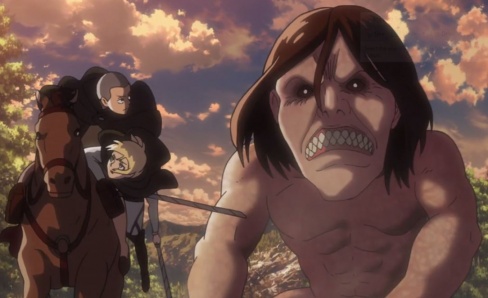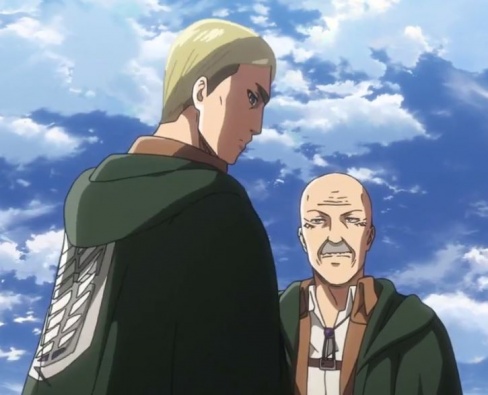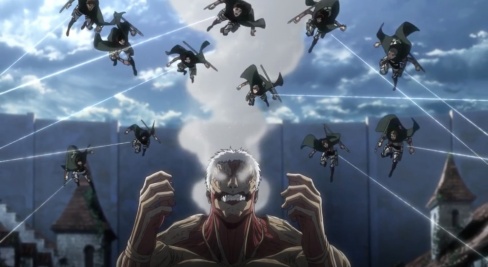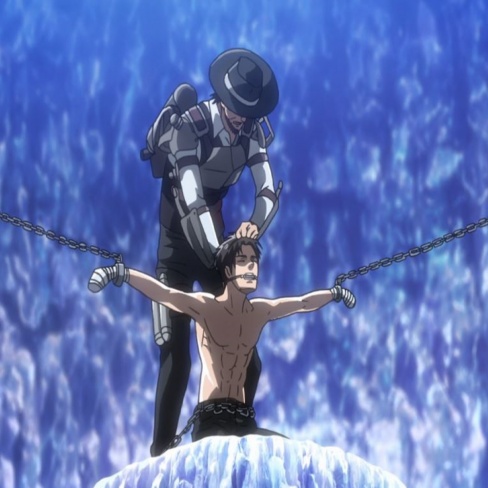Attack on Titan season 4 is underway, and as the countdown to this gruesome anime/manga’s end continues, it seemed like an opportune time to discuss the future of the series, namely an American live-action film version in the works at Warner Bros. There’s been no word on the project since IT and The Flash director Andy Muschietti joined the project two years ago, which is understandable given his priorities have been those films, but the prospect of an American Attack on Titan film is still tantalizing enough to discuss.

Christopher Chiu-Tabet: An American Attack on Titan movie is a hilarious prospect on paper: it is arguably the definition of cultural differences between American and Japanese audiences, as it’s an extremely gory horror manga aimed at teenage boys. There’s no way you can make it into a PG-13 film franchise; it’d be a guaranteed loss for the studio. And yet: few manga would be so well suited to being adapted in America, given how much the story owes to northern European culture and mythology — it’s a Japanese cartoon where only one main character is a biracial Japanese person (Mikasa Ackerman).
Jake Hill: Yeah! I’m a total anime noob, but I love (and review) Attack on Titan and I think it is uniquely well-suited to get the Hollywood treatment. A lot of anime uses what’s called Mukokuseki, which is a sort of ethnically neutral style. But even though it’s a fantasy story, Attack on Titan is a lot more specific — there are a lot of blonde characters with German names, and the fact that there is one biracial Asian character is something of an important plot point. What I’m trying to say is, it’s the kind of setting I think could actually benefit from some specificity when it is put into live action.
My big concerns would be how the show handles its politics. I’ve been really interested in tracking the narrative surrounding the manga’s creator, Hajime Isayama. It’s undeniable that he seems to have… a predilection towards fascist imagery. But whether or not he himself is a straight up fascist is a little less clear. The cultural context for that sort of thing is really different in Japan, so there’s a lot of thoughtful approaches a movie could take. I for one would be delighted by a Starship Troopers style deconstruction, one that uses the fascist politics satirically. There’s a lot of opportunity to explore how miserable these characters are, and how their loyalty to a terrible system of governance ultimately harms them.
Chris: I’m still unclear on that; a lot of the story seems preoccupied with overthrowing a corrupt government that’s apparently unconcerned by the Titans eating all the poor people. As I understand, the anti-Semitic interpretations came about from the depiction of a persecuted minority as having the ability to turn into actual monsters, as if that justifies their marginalization. It’s unfortunate, yes, but no one bats an eyelid when X-Men portrays persecuted people — Jewish and non-Jewish — with dangerous superpowers.
That’s not to say Japan doesn’t have a nationalist problem — the country has never reckoned with its history of fascism the way Germany has, and the current and last Prime Ministers are members of a revisionist cult. But can people really say Attack on Titan is saying the Japanese are a persecuted minority after WW2 the way Jewish people have been harmed over the centuries?

Jake: Well that’s the thing. Attack on Titan is a fantasy story, so it deals in metaphor. Written well, a metaphor can be a clear and powerful message, obvious to anyone who sees it. But written poorly, it can mean anything to anyone. And that includes bad stuff to bad people. Attack on Titan is weird in that it’s a fantastic story, but the themes can get… muddy at times. That’s why I’m so fascinated with the cartoon as an adaptation. It can smooth out some of those messy things from the manga. Sometimes it’s successful and sometimes, less so.
I guess the big open question is how much we trust the movie to be thoughtful. Hollywood as an institution has a mixed track record. I think I’d say they get more wrong then they get right. But since Andy Muschietti is the name attached, he’s the one we should look at. I liked the first It film quite a bit, but the second one was a real letdown. I’ve come to believe that this is because of Cary Joji Fukunaga, who wrote the screenplay to the first one, but not the second. What do you think Chris, is Muschietti a reliable talent? Do you think he’s going to be able to parse those tricky themes?
Continued belowChris: I’m not the best person to ask, as I’m biased against horror films: they’re inherently bad because they’re gory or scary, unless they’re good. (Ironic, I know, but I’m as surprised as you are that I’m discussing this comic with a skinless humanoid on the cover.) The first IT definitely impressed me with its humor and charm, the second less so because of how long it was, but even it had Bill Hader’s wonderful performance. (It’s truly a book designed to be a 10-part TV show.) I think The Flash will prove whether IT was a fluke or not, because I’ve heard very mixed things about his first film, Mama.
Jake: I rather liked Mama but it didn’t really prove Muschietti capable of much nuance. I guess that means that I’m pessimistic, but I’ll be happy to be proven wrong. I love the show. I like what I’ve read of the manga (I think Isayama is a gifted horror artist). I really like the power metal EP Epica put out based on Attack on Titan. So I really want it to work out. But I think you need a clever filmmaker, one who can film action and who has the sensitivity needed to make the characters and themes work. Can you imagine, say, Ryan Coogler’s Attack on Titan movie? Or Guillermo del Toro? I want to like this movie but it seems uniquely hard to adapt.
And how do you make just one movie? I’m sure they are only going to adapt up to maybe, The Battle of Trost, which is halfway through season one. And then they just hope it’s a big hit and they can make 6 more films? I can’t think of a single time that approach has worked, ever. I don’t envy Muschietti, but I’m rooting for him to succeed.

Chris: Given Harry Potter and Paddington producer David Heyman is involved, I think Warner Bros. do expect him to ensure it becomes a multi-film franchise. After all, it revolves around young adults and the target audience will be young adults, and Twilight and The Hunger Games became pretty successful YA film series in Potter’s wake. Of course, that boom has long since ended with the likes of Divergent and Maze Runner.
Of course, when the Divergent films failed, Lionsgate tried to finish the series as a Starz show, but that became trapped in development hell. Considering Warner Bros. is a significantly larger studio hungry to make its streaming service a household name though, I suspect Attack on Titan would likely be a monster priority for HBO Max if it fails at the box office.
Jake: Those are all really good points. I first came across Attack on Titan when I was working in a comic shop in 2012. So that’s the environment I most associate it with- being surrounded by smart, chatty people who really want to dig into things like the themes and the artwork. But I guess if I was a studio exec, I’d see it as a really dark YA thing, like those examples you mentioned. That’s the thing with studio execs, right? They are always chasing the last hit, never thinking a move ahead.
You also raise a great point about streaming. Given WB’s intended plans for 2021, I think it’s safe to say that HBO Max is a huge priority for them. I could easily see a planned Attack on Titan movie turning into… another TV show. A live action one. And that’s cool, I think the manga and anime are both really well paced. But then… how similar an adaptation will it be? How similar should it be? I know the choices I would make in an adaptation, but part of me is screaming that a series like that would just end up ending like Game of Thrones and nobody wants that!
Chris: Well, let’s hear it! But first, I want to outright note there was already a two-part live-action adaptation from Japan in 2015, which was very different from the source material, because it took place in a generic modern post-apocalyptic world, and because the manga wasn’t finished. There would be a lot of pressure on Warner Bros. to do something different, namely depicting that anachronistic world, and by having storylines and characters that weren’t used in the film. I don’t know how much impact fan outcry actually has, but considering how risky anime films are, they can’t afford to do another take without Levi. (Imagine if Ghost in the Shell had a mostly Asian cast? It might’ve had a chance.)
Continued below
Jake: Ha, what would I do? Well, as a fan, I would want the adaptation to be pretty faithful. I think there are some places where you can trim the story, especially with the supporting characters. And there are some places where I wouldn’t mind some more characterization. I love Marlo and Hitch more than most, and their story adds a lot of emotional weight to the story, but they are ultimately a little bit unnecessary. But there are tons of characters whom I would love to spend more time with. Sasha only gets one episode focusing on her. We hardly get any backstory for Connie at all. Mikasa is given a lot more to do in the show than the manga, but I could use even more! And Hange Zoe is to me, one of the most fascinating characters in all of fiction, as much about them as possible!
I also think that there a couple of same-sex relationships that I would love to see explored and contrasted in a big way. Krista and Ymir are confirmed in the story to be romantically involved, and I would love to see a whole lot more about the two of them. Erwin and Levi’s relationship isn’t romantic in the same way, but they are the most important people in each other’s lives respectively. That’s so interesting! What does it mean that these two badass dudes are never going to marry and are wholly devoted to each other? That’s rich character stuff!
That’s probably too much for a feature film, which is why the TV idea seems so enticing (but risky). Fortunately, each season is built around a major battle, which guarantees a big action scene, and gives the story weight and shape. You can do a whole movie that starts with the walls getting breached, and then takes them up to and through the Battle of Trost. Same for the mystery of the female titan. The Battle of Castle Utgard and the events that follow is one story. The conflict with Kenny and his mysterious benefactor can be one. The Battle of Shiganshina, and the juicy moral deliberations that follow is a story. And the rest of the story could be fit into another story or two. So, by American storytelling conventions, that’s 6 or 7 seasons of TV or the same number of films. That’s a lot! They have to be really confident to embark on a project like that. But I think there’s an audience there. Everything that made Game of Thrones into a crossover hit is also true about Attack on Titan… well except the sex. Attack on Titan is a remarkably unsexy story.
Chris: I think certain people would disagree with you, but I’m not one of them (my totally boring reason is that it is, as I keep saying, a YA story, and that would be inappropriate).
As I also said, the Battle of Trost is a great arc for a first film, anything more and it would become badly paced, as the story follows Eren, Mikasa and Armin from childhood. It gets more complex with the next few cours (as the usually 13-part arcs in anime are typically referred to), as you can’t really spread out the big reveals in the episodic manner they’re done there, you’d have to alter the story so the traitors are all unmasked at the same time.
And no disrespect to Krista, but I certainly don’t know how you’d make the cour about her ascension to the throne work in the same movie as the Battle of Shiganshina. This is likely a result of me finding the arc quite forgettable compared to the others (I didn’t even remember Kenny until you mentioned him), but consider all the backstory that’s revealed as a result of season 3’s second cour.
Jake: The fact that you found that particular story forgettable is, to me, an argument for this entire enterprise. On paper, Kenny is a great character. His story is interesting! But something got lost in the telling. Information wasn’t parcelled out in the right way, the pacing was a little off, stuff like that. But another crack at the story, done right, could be the solution we need. It’s like the Star Wars prequels vs the Clone Wars cartoon. One was a disaster, but the other proved that it wasn’t the ideas that were bad, it was the execution.
Continued belowI guess what I am saying is that a good Attack on Titan film could have a similar effect, and redeem the weaker parts of the comic and show. That is my best case scenario!

Chris: That is a great point, although I think the story could be relegated to a spin-off set during the interim before the final years of the story. What else do you think a film could improve upon?
Jake: I covered the biggest stuff for me. But I guess my final thoughts are this: Attack on Titan was probably outlined in some way, but it’s clear that a lot of the story emerged in the telling. That’s not the case for a hypothetical movie. The story has been told. So I’d love a series of expensive, flashy, live action films that adapt the story from the manga and anime, but with the benefit of understanding that comes with the completed series. There’s a bunch of cool foreshadowing that can be worked in, and beloved characters with slim roles such as Mikasa, Connie, Sasha, and Jean, can have their parts built up. This is such a hard story to adapt, but the high risk of failure stands in contrast with the high reward of a job well done. That means that this screenplay can’t be written by one of these Hollywood blockbuster machine guys, it needs a serious master. Anything less drives the chances of this flick being a disaster pretty high. I don’t want it to be a disaster! I want it to be a masterpiece!
What about you Chris, any closing thoughts before we nervously devolve into rumor chasing and fancasting?
Chris: I think an American Attack on Titan could be a very special thing: Alita came so close to being a successful, weird and visceral live-action manga, and at the very least no one would propose turning the whole cast into giant action figures of the anime characters. As I’ve noted before, I’m not really a horror guy, and the last thing I expected was to become so invested in this primal world of giant skinless cannibals. Even if the manga and anime don’t stick the landing, there is something so unique about this nightmarish world, its characters and monsters that it would, even toned down, make for a truly special blockbuster with teeth (no pun intended).
Thank you for reading folks, and if you have any thoughts on a prospective American film adaptation of Attack on Titan, then be sure to share them in the comments. In any case, enjoy the final chapters of the manga, and the final season, and hopefully, someday, we can all watch a great live-action film version in the theater together.






